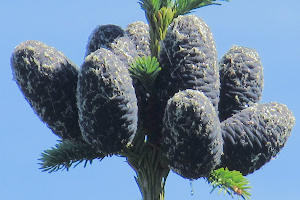Suppose we construct a similar maze. But instead of slime mold, we will run water into the maze. The water will flow through the maze until it reaches the exit. No oatmeal needed. Like the slime mold, the water will stop flowing up the dead-end passages. However, in this case, we don’t think it is so amazing, because we understand the simple process of the flow of the water. It’s natural. In fact, water does this all the time in any landscape where it rains, for example, western Oregon. These mazes become streams and rivers.
Tree roots grow much like slime mold. They branch out gathering nutrients. The roots that are successful will grow more than others. The same is true above ground. The branches that receive more light will grow more than others. No surprise here. This is just how we would expect trees to grow.
It's a mystery when plants do surprising things that seem like intelligent behavior. Whenever scientists find something mysterious, they try to find an explanation for it. Once we understand the explanation, of course the behavior no longer seems mysterious. Once we’re in on the trick, we no longer think it’s magic. However, unlike learning a magic trick, this is not a letdown. Rather, as we gain a deeper understanding of how nature works, we experience even greater wonder. And once we understand the explanation for the phenomenon, it no longer seems surprising. In fact, we would be surprised if, for example, slime mold didn’t behave in the way that it does. When we understand the role of natural selection, it’s natural that trees put on a big cone crop when stressed. We would be surprised if they didn’t.
In many of these cases, what appears to be intelligent behavior is just that: appearance. It has a natural explanation. No intelligence needed. When we do the science to find the explanation, we have a richer understanding of nature.
We might say that what looks like intelligence would be better characterized as logic. But the logic is the logic of science. When we understand the processes and principles that are operating, it is, of course, logical that plants would act according to these principles.
Now you might say that all this assumes that we understand intelligence as a human attribute, something that requires a brain and higher levels of thinking and reasoning. As a matter of fact, the standard definition of intelligence refers to this very thing:
The ability to learn or understand from experience; ability to acquire and retain knowledge; mental ability. - Webster's New World College Dictionary
This may seem to be anthropomorphic, but it is our common understanding of intelligence. However, we recognize that many animals demonstrate a similar intelligence. They have demonstrated their ability to solve problems and learn from their experience of their environment. But why should we limit intelligence to animals? If plants can show what appears to be intelligent behavior, why not call that intelligence? After all, language is not static. As we learn more about plant behavior, we may come to see it as intelligent.
It is true that we think of intelligence as a human attribute. That is normal since we are human. But I would say that it is a mistake to force this description onto trees and other plants. As when considering personification in nature writing, this kind of anthropomorphism may not be appropriate.
Let’s think about why we consider animals to be intelligent. It is just because when we learn more about animal behavior, we see that they reason, socialize, and perhaps even use language like humans. In other words, when we understand them, we see that they possess the same kind of intelligence as we have. It’s just that their lives are very different from ours and we don’t, for example, understand their language. On the other hand, this is not what we see when we learn more about plants. What we see is processes that do not require intelligence. In amazing ways, plants have evolved to adapt to their environment without the need for intelligence.
We make the same distinction about ourselves. We can describe processes that happen in our bodies that are necessary for survival. The processes of the cardiovascular system, endocrine system, lymphatic system. All these amazing processes are essential for human life. However, we would not say that they show intelligence on our part. We are not even conscious of these processes. Similar biological processes in trees do not indicate intelligence either.
Finally, does calling plants intelligent add anything to our understanding? Does it suggest any new avenues of research or suggest to us any explanation of their behavior? I submit that it does not. We would do better to simply study the amazing processes that trees use to survive, thrive, and reproduce.
In fantasy writing, trees act with human intentions and powers of action and thought. It is often delightful, but it is good to remember that it is fantasy. The use of similar anthropomorphisms has become popular in some recent nature writing. Writers seem to think that this gives us an elevated view of nature and fills us with respect and awe. However, learning the details about the life of trees should fill us with wonder and awe. It’s better to simply observe them as they are without imposing the story of our existence upon them.


No comments:
Post a Comment